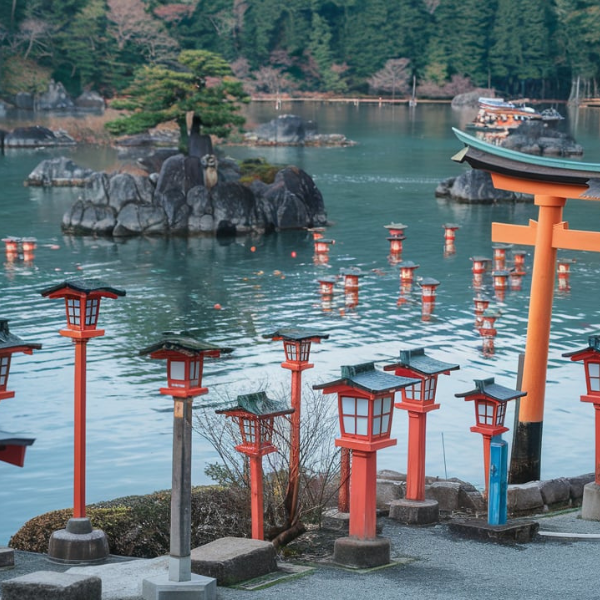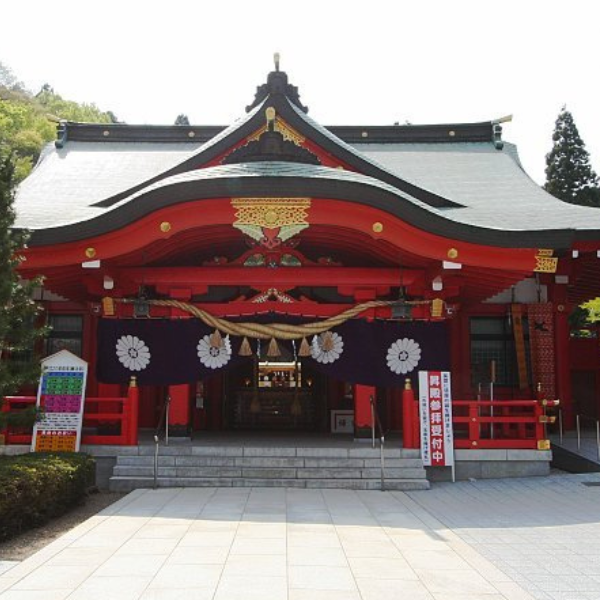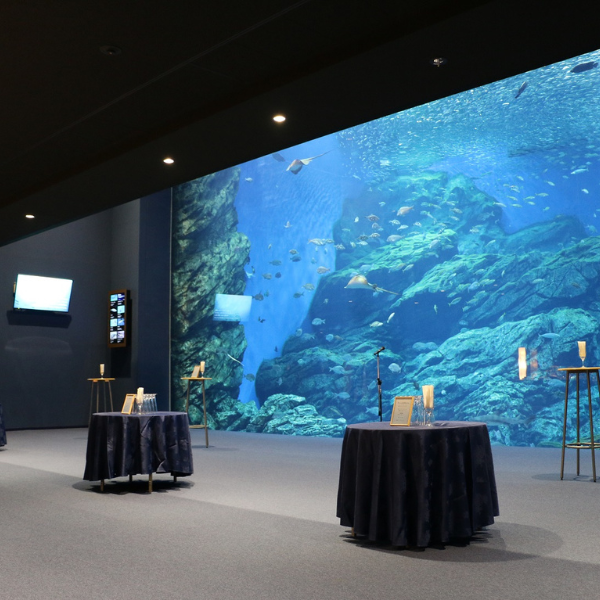Matsushima Bay , located in the northeastern part of Japan in Miyagi Prefecture, is celebrated as one of the Three Views of Japan (Nihon Sankei). This famous bay is dotted with over 260 small, pine-covered islands, offering breathtaking views and a peaceful escape from bustling city life.
It is a destination filled with history, culture, and natural beauty, making it a must-visit spot for any traveler to Japan. Whether you’re planning a relaxing Matsushima Bay cruise , visiting temples, or enjoying local seafood, there is something magical about this place.
See More : Samurai vs Ninja: Who Wins the Fight of Skill & Strategy?
A Journey Through History
The history of Matsushima Bay is as rich as its scenery. It has been admired by poets and samurai for centuries. The bay is especially famous for its connection to Matsuo Bashō , Japan’s most famous haiku poet. Bashō visited Matsushima on his journey, known as Oku no Hosomichi , and was so overwhelmed by the view that he reportedly couldn’t put his feelings into words. This historical connection adds a layer of depth to the experience of visiting Matsushima, making it more than just a sightseeing spot but also a cultural pilgrimage.
Adding to its historical importance is Date Masamune , the powerful samurai ruler of the region during Japan's feudal period. He helped shape the town of Matsushima, constructing the Zuiganji Temple , one of the area’s most important cultural landmarks. Visiting Zuiganji feels like stepping back in time, giving you a glimpse into the grandeur of Japan’s feudal past.
See More : most beautiful places in japan
How to Get to Matsushima Bay

Traveling to Matsushima Bay is straightforward and accessible from major cities like Sendai . You can reach Matsushima via the JR Senseki Line , which takes you from Sendai Station to Matsushima-Kaigan Station in about 30 minutes. This scenic train ride offers beautiful views of the Tohoku region and makes getting to Matsushima part of the experience.
If you’re arriving by car, there’s free parking available near the main attractions, making it convenient for those exploring by road. The nearby town of Shiogama also serves as a popular gateway to Matsushima, especially for those looking to enjoy a Matsushima Bay boat tour from the Marine Gate Shiogama port.
Matsushima Bay’s Iconic Cruises
One of the best ways to experience Matsushima Bay is by taking a cruise . The cruises offer stunning views of the bay’s numerous islands, giving you a different perspective from the shore. As you glide across the calm waters, you will pass by pine-covered islands with names inspired by their shapes, like Futagojima Twin Islands and Senganjima.These boat tours, available from both Matsushima-Kaigan and Shiogama , are perfect for soaking in the tranquil beauty of the bay.
If you are interested in history, some cruises include commentary that explains the significance of the islands and their place in Japanese history. For those seeking a more intimate experience, there are private boats and smaller pleasure boats available, allowing for a quieter and personalized exploration of the bay’s scenic wonders.
Scenic Walks and Viewpoints
While the cruises offer spectacular views from the water, the land around Matsushima Bay is equally enchanting. For those who prefer to explore on foot, there are several famous viewpoints that offer panoramic views of the bay.
- Tomiyama and Otakamori are two of the most popular spots for hiking. Both offer trails that lead to breathtaking viewpoints, where you can look out over the islands from a higher vantage point.
- Another notable spot is the Kanrantei Tea House , a historical tea house that once belonged to the Date family. Here, you can enjoy a traditional cup of green tea while admiring the bay from its windows—a serene and culturally rich experience.
Cultural Landmarks: Zuiganji and Entsūin Temples
Visiting Matsushima wouldn’t be complete without exploring its cultural landmarks, especially Zuiganji Temple and Entsūin Temple .
- Zuiganji Temple is an important Zen Buddhist temple with a history dating back to the 9th century. It was rebuilt by Date Masamune in the early 1600s and remains one of the most beautiful examples of Zen architecture in the region. As you walk through its peaceful grounds, you’ll encounter stunning rock carvings and centuries-old cedar trees that add to the temple’s tranquil atmosphere.
- Entsūin Temple , located nearby, is also worth a visit. Known for its lovely gardens and beautiful autumn foliage, Entsūin is a peaceful retreat. Inside the temple, you’ll find a rare depiction of Christian iconography, a unique blend of Japanese and Western art that dates back to the early Edo period.
Both temples offer insight into Matsushima’s rich cultural history, and their serene environments provide a perfect counterbalance to the bay’s natural beauty.
Best Time to Visit Matsushima Bay
Matsushima is a year-round destination, but the best time to visit depends on what you want to see.
- Spring : Cherry blossoms (sakura) add an extra layer of beauty to the islands. This is a perfect time for photography, as the pink blossoms contrast beautifully with the green pines and blue waters.
- Summer : The warm weather makes it ideal for cruising and outdoor activities. Festivals and fireworks shows are common, adding a lively atmosphere to the bay area.
- Autumn : Matsushima’s temples and gardens are at their most stunning during autumn when the leaves turn fiery red and orange. The cool, crisp air makes hiking more enjoyable as well.
- Winter : Though colder, winter offers a quiet, reflective atmosphere. Snow on the islands gives the bay a mystical appearance, and the area is much less crowded, making it ideal for those seeking solitude.
Matsushima Bay’s Culinary Delights
A trip to Matsushima Bay isn’t complete without indulging in the local cuisine. The region is particularly famous for its seafood, especially oysters . Matsushima Bay oysters are considered some of the best in Japan, known for their freshness and delicate flavor. You’ll find plenty of restaurants offering both raw and grilled oysters, often served with a squeeze of lemon or a dipping sauce.
Another local specialty is anago , or saltwater eel. It is often served over rice and is a must-try for seafood lovers. For a more immersive culinary experience, some restaurants offer kaiseki , a traditional multi-course Japanese meal that highlights the freshest local ingredients. These meals are not only delicious but also beautifully presented, turning your dining experience into a work of art.
Impact of the 2011 Tōhoku Earthquake
In 2011, Matsushima Bay was affected by the devastating Tōhoku earthquake and tsunami. However, due to the protection offered by the bay’s many islands, the area sustained less damage compared to other parts of the coast. The people of Matsushima showed incredible resilience, and today the region has fully recovered. Visiting now offers not only an opportunity to experience its beauty but also to witness the strength and perseverance of its community.
Practical Tips for Visiting Matsushima Bay
- Transportation : The JR Senseki Line offers easy access from Sendai Station to Matsushima-Kaigan Station . Alternatively, you can catch a boat from Shiogama if you want to start your trip with a scenic cruise.
- Best Viewpoints : Don’t miss the views from Tomiyama and Otakamori , especially if you enjoy hiking. They offer some of the best perspectives of the bay’s islands.
- Food : Be sure to try the local oysters and anago . If you have time, indulge in a kaiseki meal for an unforgettable dining experience.
- Timing : Plan your visit based on the season. While Matsushima is beautiful year-round, spring and autumn are particularly stunning.
Conclusion
Matsushima Bay is a place where natural beauty, history, and culture come together. Whether you are admiring the view from a boat tour , exploring the grounds of Zuiganji Temple , or savoring fresh oysters at a local restaurant, every experience here feels deeply connected to Japan’s heritage. The bay’s serene landscapes and rich history offer a perfect escape for travelers looking to immerse themselves in the essence of Japan.
When planning your trip to Matsushima Bay , make time for its many treasures. You’ll leave with a deeper appreciation for this scenic gem and memories that will last a lifetime.
Leave a comment
Your email address will not be published. Required fields are marked *



